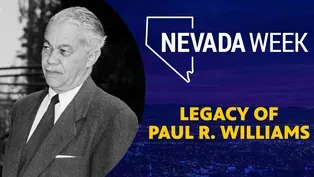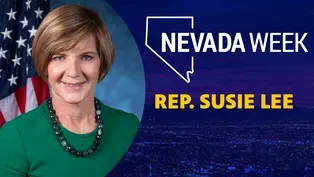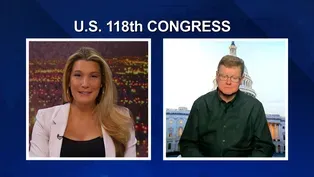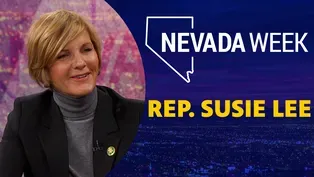
Rep. Mark Amodei
Clip: Season 5 Episode 30 | 9m 47sVideo has Closed Captions
We talk one-on-one with Rep. Mark Amodei about his plans for the 118th Congress.
We talk one-on-one with Rep. Mark Amodei about his plans for the 118th Congress.
Problems with Closed Captions? Closed Captioning Feedback
Problems with Closed Captions? Closed Captioning Feedback
Nevada Week is a local public television program presented by Vegas PBS

Rep. Mark Amodei
Clip: Season 5 Episode 30 | 9m 47sVideo has Closed Captions
We talk one-on-one with Rep. Mark Amodei about his plans for the 118th Congress.
Problems with Closed Captions? Closed Captioning Feedback
How to Watch Nevada Week
Nevada Week is available to stream on pbs.org and the free PBS App, available on iPhone, Apple TV, Android TV, Android smartphones, Amazon Fire TV, Amazon Fire Tablet, Roku, Samsung Smart TV, and Vizio.
Providing Support for PBS.org
Learn Moreabout PBS online sponsorshipWelcome to Nevada Week .
I'm Amber Renee Dixon.
We begin up north where in November, Nevadans elected Republican Mark Amodei to his seventh term in Congress.
This session, he was appointed Chairman of the House Appropriations Committee's Legislative Branch Subcommittee and is responsible for overseeing Congress' budget.
As such, we started our conversation with where he stands on whether to raise the debt ceiling.
(Rep. Mark Amodei) So separating the wheat from the chaff is the first step in that.
And then once you know you're dealing with those actual facts, Amber, then it's like, Okay, so let's see what we can do here in terms of the right thing, because as we know, the cost of the national debt, because interest rates have gone up a heck of a lot, is a big deal now, as opposed to just a few years ago when everybody liked interest rates.
-Would you vote to raise the debt ceiling if no cuts were made?
-Well, you know what?
Here's the problem: I think it's time for an honest look that 75% of every federal dollar spent is what is called "mandatory spending."
Now, that's Social Security, Medicare, Medicaid, interest on the debt are the big ones.
But when you say no cuts were made, it's like, Well, we shouldn't be looking at cuts that pull the rug out from under people who are already in those programs or close to eligibility.
But in a prospective sense, Amber, it's time to look at that.
And also, when you take a look at the last two years, four years in general, there were many items of spending that were put into mandatory spending, which means Congress has no discretion.
And so the answer to your question is this: I will vote for what I think is responsible in terms of keeping the federal government from crashing financially and continuing to stack up debt.
-Where do you stand on cuts to Social Security, Medicaid, and/or Medicare?
-You can't pull the rug out from under people that are already receiving those benefits.
Then for people who are responsibly planning their retirement, you can't say, Hey, even though you're three years away, guess what, everything's different.
So I think that's part of the legislative process where you evaluate: Are we going to change eligibility, are we going to change benefits to some extent, and when--that's a very key word--"when" would those take effect?
And so a public discussion on the record with full transparency would be a healthy thing to that process, and see what we learn as a result of that.
Nobody's even considered it because it's, you know, it's like, Oh, my God, it's political suicide; the campaign people will murder you.
And all that other sort of stuff.
It's like, Well, guess what?
There's a lot of folks that are gonna get murdered if we keep heading down this thing and just going, Eh, the deficit doesn't matter.
I'll tell you this: I am a person who does not think that the deficit doesn't matter.
-So let's say you are a few years away from retirement and collecting Social Security.
You may not have to worry if Mark Amodei has his say.
But if you're, let's say-- -Well, I think-- - --40 years old and decades away from retirement, you may have to start making different plans.
-That's a, that's a fair categorization.
I think generally, that's accurate.
-Okay.
You did bring up Kevin McCarthy.
And I'm wondering with the House majority that you have with Republicans, slim majority, what would you tell Americans about how well you think House Republicans will be able to work together after the discord that we saw in electing him to House Speaker?
-Well, a couple of things.
First of all, I think that process, and you may go, you may give me a funny look, but I think that process served to unite Republicans more than they were before the process in terms of talking about those issues in the process that were more important in terms of transparency, amendments, all that sort of stuff.
So I think actually, it feels stronger than it did after the first vote, you know, after 15.
The other thing you have to look at, Amber, is what are those big principles that Republicans had said they would concentrate on--the border, energy, the economy, education, oversight, all those things?
And I don't think there's much-- I don't think there's much discord amongst the troops, if you will, as far as those issues go.
I expect Republicans to stay united on that.
There will, there will be some issues that come up from time to time, which because Republicans love intramurals, there will be some issues that come up from time to time, which will test that.
But I think for the most part, it's been a healthy process.
We've come out the other end stronger, and I look forward to getting along with the agenda.
The first week on the floor, in terms of the IRS agents and anti-violence against Right to Life locations and stuff like that, were not hard votes, I think, for any Republicans.
Matter of fact, you had some Democrats join in some of those.
So we'll see.
-With the makeup of the House and the slight majority that Democrats have in the Senate, of your priorities this session, what do you think is most likely to become law?
-Let me answer you this way: Nevada is a state that is phenomenally unique in the Union in that it is owned, like 80 to 85% by the federal government.
That's not in and of itself a bad thing.
But where you're sitting in Las Vegas, that town is completely surrounded by federal land.
Henderson is.
Tonopah is.
Winnemucca is.
Reno is.
Everybody.
And so when you talk about economic development in Nevada, whether it's, whether it's Southern Nevada, whether it's Western Nevada, or whether it's rural Nevada, you have to go treat with the federal government regarding the real estate in order to do that.
And so the biggest example is the Southern Nevada Public Lands Management Act, which is 22, 23 years old now, something like that.
Very few people realize that that authorized the disposal in and around Las Vegas of 70,000 acres.
And do you know how much has actually been disposed of after two-plus decades?
About half.
And the reason I tell you that is the cliches of, Oh, my God, irresponsible growth, you know, by the Clark County Commission, the Las Vegas City Council, the Henderson City Council.
It's like, Well, when you look at over 22 years, 35,000 acres, that's not exactly, Yeeha!
Warm the bulldozers up and start knocking down desert tortoise habitat.
So I say-- when you say "priorities," it's like Clark County and the Southern Nevada Public Lands Management Act are both due for an update.
-That's a great example of bipartisanship, because that Bill you're talking about, the Clark County Lands Bill, was the work of Senator Catherine Cortez Masto.
Here's another example, but maybe not so much bipartisanship.
And you can help me understand why not.
The topic of immigration.
We recently had her on, and she talked about, Both of these things can be accomplished: You can enact protections for Dreamers, and you can also bolster border security.
And that sounds similar to what I've read you talk about when talking about fixing the immigration system.
But what is the difference here?
Why isn't there comprehensive immigration reform happening, then?
-Well, actually, it's because both sides are addicted to their political talking points.
And there are exceptions, but for the most part, both sides have been afraid to stick their neck out and go, Hey, enough is enough.
The last time we did immigration was when Ronald Reagan was the President 30-some-odd-years ago.
And so you're sitting there going, A few things have changed in over three decades that we should react to.
There are answers to immigration which don't let anybody align, don't mean that you can have gang members and felons and all that other sort of stuff being given green cards or whatever.
The problem is one side says, screams amnesty every time you do it, and the other side says the Republicans hate your guts.
And as a practical matter, what we're lacking here from both sides is the political courage and the leadership to go, We got to do something about this.
Because when you do nothing, you have what we have at the border right now.
-Do you think you differ from Catherine Cortez Masto and her stance on immigration, then?
-Probably not a lot in terms of the nuts and bolts.
It's like, I mean, I signed a discharge petition a couple of Congresses ago to get the Dreamers Bill to the floor.
And it was a responsible proposal.
But you know, you get the commentator culture and the culture of cliche, and it's like, if you, you know-- Well, you know.
You've read this stuff.
But it's like, it's not helping us.
And it is Congress' job to establish a system of naturalization, which is immigration.
And we've been asleep at the switch for over three decades.
-To see Nevada Week 's full interview with Representative Amodei, including which Pro Life measures he's supporting, go to vegaspbs.org/nevadaweek.
Video has Closed Captions
Paul R. Williams the architect who designed building in Hollywood and Las Vegas (6m 19s)
Video has Closed Captions
We talk one-on-one with Rep. Susie Lee about her plans for the 118th Congress (9m 28s)
Video has Closed Captions
Rep. Mark Amodei (R) talks about his plans for 118th Congress and his new chairmanship. (20m 31s)
Video has Closed Captions
Rep. Susie Lee (D) talks about his plans for 118th Congress. (14m 50s)
Providing Support for PBS.org
Learn Moreabout PBS online sponsorshipSupport for PBS provided by:
Nevada Week is a local public television program presented by Vegas PBS















